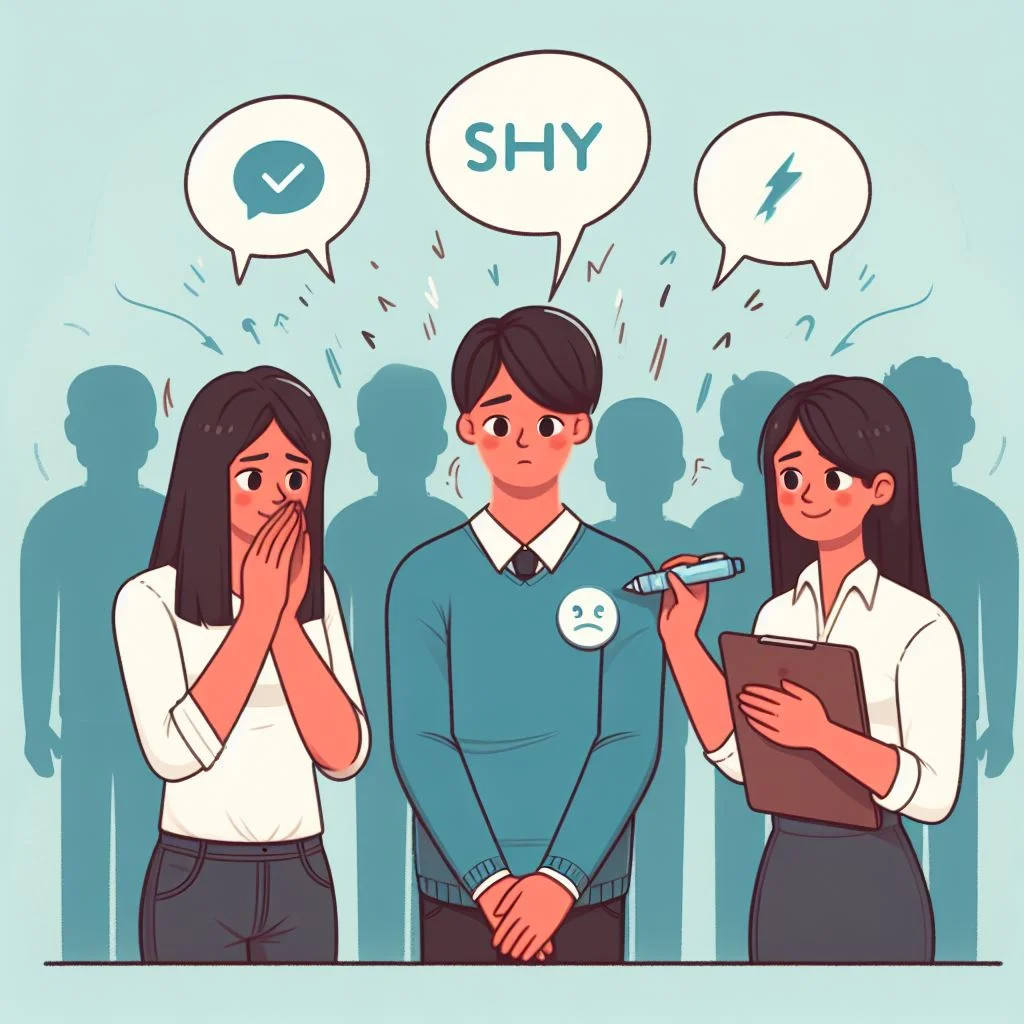Overcoming Shyness: A Complete Guide to Social Confidence
Many people deal with shyness that can hold them back socially, romantically, and even professionally. While biology plays a role, environmental factors in childhood and unhelpful thought patterns also contribute to shyness and extreme introversion past normal levels.
The good news is that making meaningful progress to overcome debilitating shyness is possible through techniques like cognitive behavioral therapy (CBT), social skills development, anxiety reduction tactics, and more. This guide covers root causes, impacts, and actionable tips to steadily boost social confidence over time.
What Causes Shyness?
There are a few key factors that scientists have identified which contribute to chronic shyness:
- Genetics
- High sensitivity since childhood
- Brain structure differences
- Overprotective or critical parenting
- Social isolation early in life
- Bullying or exclusion
- Unhelpful thought patterns
Many shy adults experienced social struggles early on and grew up hearing internal and external criticism about their social capabilities, compounding social anxiety, nervousness, and wariness around others.
But inherent biology is not destiny – while you can’t change genetics, you can shift thought patterns, learn social skills intentionally, and build confidence through practice interacting with people.
“We are what we repeatedly do. Excellence, then, is not an act, but a habit.” – Aristotle
Impacts of Shyness
Shyness that persists beyond a normal introversion level can negatively impact wellbeing and success in many areas if left unaddressed. While a little social anxiety can be protective at times, chronic extreme shyness leads to avoiding experiences that enrich life.
Personal Wellbeing
- Lowered self-esteem – Constant harsh self-criticism erodes self-image over time. Shy individuals discount accomplishments and dwell on perceived flaws.
- Increased rates of anxiety and depression – Social isolation and loneliness combined with distorted negative thinking sinks mental health. Nearly 50% of extremely shy people deal with clinical depression.
- Loss of experiences due to risk avoidance – Shyness blocks going after many goals from dream jobs to relationships to once-in-a-lifetime opportunities out of anxiety or perfectionism. Regret sinks in later.
Professional Success
- Less likely to be hired or promoted – Social fluidity and confidence unconsciously influence employers. Shy body language, speech patterns, and not advocating for oneself can be misinterpreted as disinterest or incompetence stalling career mobility.
- Networking difficulties hamper progress – Inability to smoothly schmooze at conferences, socials, meetings limits critical professional connections. Power brokers tend to sponsor outgoing direct reports for plum assignments.
- Limited leadership potential – Highly shy workers less often get tapped for management roles given public speaking demands and leading teams. Extroversion remains rewarded in work cultures leaving shy achievers behind.
Social Life
- Strong feelings of loneliness – With smaller social circles and superficial connections that don’t provide emotional intimacy, shy people describe profound loneliness at rates way above average. 12% say they always feel lonely.
- Small circle of friends – Shyness impedes meeting enough new people to develop close trusted friendships. Shallow relationships leave shy folks starved for meaningful social bonds.
- Strained romantic relationships – Dating anxiety causes single shy folks to stay that way much longer. Married shy people report lower relationship satisfaction and bedroom issues like performance anxiety or discussing desires. Communication barriers strain partnerships.
- Isolation and disconnection – As people pull away from increasingly painful social discomfort into relief of isolation, larger disconnection from community and belonging worsens problems.
But structured help tackling shyness through counseling, social skills building, facing fears, and anxiety reduction techniques can dramatically turn this around into improved confidence, relationships, careers, and life satisfaction.
But taking constructive steps to develop social skills and confidence can vastly improve social, work, and psychological outcomes.
| Without Help | With Help |
|---|---|
| Declining mental health | Improved self-esteem |
| Limited career options | More professional opportunities |
| Loneliness, few friends | Rich social connections |
| Missed experiences | Pursuing goals and interests |
The more tools and support shy individuals have for facing fears and developing competence, the more likely confidence grows over time.
Tips to Overcome Shyness Step-by-Step
These actionable techniques derived from psychology research and counselors’ experiences working with clients can help turn the tide to defeat debilitating shyness:
1. Seek Counseling or Coaching
Working regularly with a therapist or coach using cognitive behavioral therapy (CBT) techniques creates structure and accountability for addressing thought patterns undermining social confidence. Counselors help clients slowly face fears through exposures while limiting safety behaviors. [Over 250 studies affirm CBT’s effectiveness for social anxiety issues.]
2. Start Small with Low-Risk Situations
Rather than jumping straight into nerve-wracking networking events or speeches, start practicing social skills in casual low-stakes settings first like:
- Brief exchanges at the grocery store
- Chatting with a barista at the café
- Greeting new acquaintances casually
Celebrate small wins interacting without self-judgment to build confidence before higher pressure situations.
3. Use Relaxation Techniques
When anxiety surfaces, using portable relaxation techniques can calm the mind and body:
- Taking 5 deep belly breaths
- Going on short mindful walks
- Repeating centering mantras internally
This prevents panic attacks paralyzing participation.
4. Build Self Confidence

Many shy people focus way more on self-criticism rather than self-compassion. Actively shift negative self-talk patterns through:
- Writing down past achievements
- Daily affirmations of strengths
- Self-compassion meditations
Recognizing accomplishments and speaking kindly internally bolsters confidence.
5. Improve Nonverbal Communication
Shy body language like poor eye contact, closed posture, lack of smiling/nodding can unintentionally signal disinterest during conversations.
Tips to appear more confident nonverbally:
- Steady [but not creepy staring] eye contact
- Open posture – don’t cross arms
- Smile and nod along appropriately
- Lean in to signal engagement
These simple tweaks leave people feeling more heard.
6. Develop Conversation Skills
Many shy people dread small talk, worrying they’ll bore others. Good conversational skills can be developed through:
- Asking open-ended questions
- Being an active listener – restating key points
- Commenting thoughtfully when appropriate
- Finding common interests for rapport
Checking ego and focusing attentively on dialogue partners eases strain.
7. Expand Your Social Network
To grow more comfortable socially, expand opportunities meeting friendly potential friends through:
- Classes like cooking or art
- Volunteer teams
- Professional association meetings
- Fitness groups like running clubs
- Online communities
More positive social interactions in safe environments helps generalize confidence.
8. Consider Joining a Shyness Support Group
Connecting with others facing similar struggles can provide:
- Motivation to stick to facing fears
- Accountability on progress
- Safety taking risks within the group
- Friendship with those who truly understand
Avoid isolation on the path to defeating shyness for better results.
While shyness stems from a complex interplay of nature and nurture factors, consistent effort towards self-improvement in therapy, social skill building, anxious thought retraining, and facing fears can transform social confidence over time.
Here You can find other helpful resources
Rather than resigning yourself to the limitations of shyness forever, leverage resources and support to cultivate the rich socially connected life you deserve.
The more good experiences you rack up socially, the more positive associations relay back steadily diminishing anxiety. Small gains accumulate into profoundly impactful change. Keep taking courageous steps forward past comfort zones and don’t lose hope!

